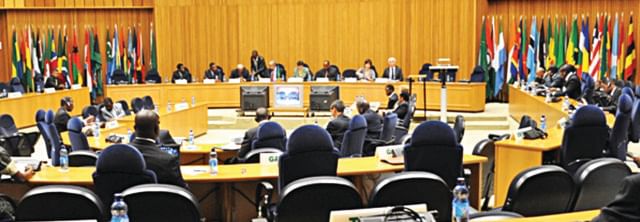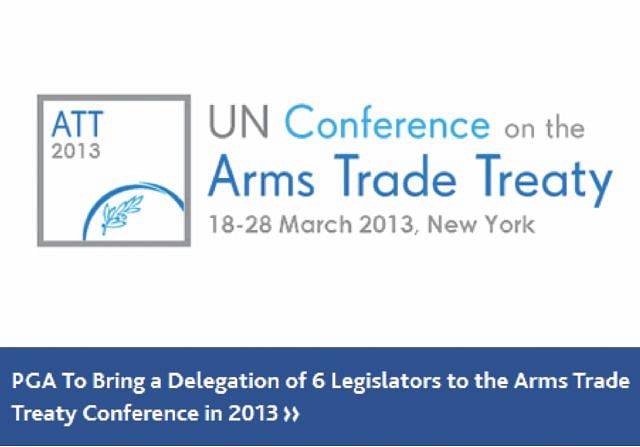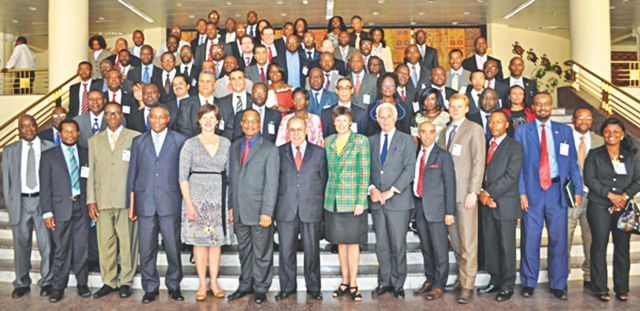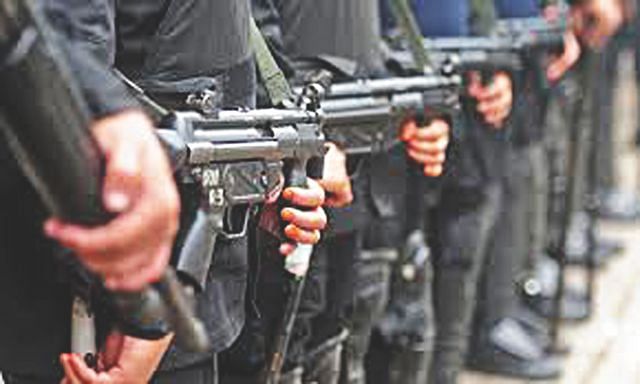Arms control in Bangladesh and the UN arms trade treaty, will it benefit us?
Although it took long deliberation and negotiation, the World Community has finally been able to initiate a process that will hopefully lead to an Arms Trade Treaty (ATT) -- the highest possible common and binding international standards to regulate, control, and monitor the massive activities that fall within the boundaries of conventional arms transfers. In fact, the United Nations (UN) Resolution 61/89, adopted in the United Nations General Assembly (UNGA) First Committee session in October 2006 initiated the treaty process. Later, in October 2009, the UN Resolution 64/48 was adopted that had gear-shifted the ATT process from “whether” we should have an ATT to “when” and “how”, and set the July 2012 UN ATT Conference as the negotiating forum to finalise the texts of the treaty.
Despite all the efforts put forth by the participating states parties, NGOs, and other participants, the UN ATT Conference held during July 2-27, 2012, failed to reach to an agreement on ATT. Nevertheless, the 67th UNGA has decided to convene another conference in March 2013 to conclude the work began in July 2012.
After all these years, it is frustrating that still there exist no binding international standards to regulate and monitor the gigantic trade in conventional arms and weapons. An often-cited fact is that due to the rigid provisions of the World Trade Organisation (WTO), the trade in Bananas are even more regulated than the trade in conventional weapons including the trade in Small Arms and Light Weapons (SALW). The void left by the non-existence of any binding international standards engenders many upsetting and agonising consequences.
Thousands of people around the world are being killed each year by weapons that are sold, transferred to irresponsible regimes, criminals, illegal militias, and terrorist groups. According to an Oxfam estimate, around 2,000 people lose their lives daily i.e., 4 persons die in every three minutes as victims of firearms. It is also causing increasing armed conflicts and casualties, human rights violations, illicit trafficking of arms, arms transfers to conflict regions, to non-state actors, and even arms transfers to countries undergoing multilateral arms embargoes.
According to Oxfam again, more than US$ 2.2 billion worth of arms and ammunitions have been exported between 2000-2010 to countries subject to multilateral (UN) arms embargoes including Iran and North Korea. Without adequate regulation of international arms transfers, which include export, import, any brokering activities as well as transit and transhipment of arms and ammunitions, and without high common standards to guide national export decisions, the human toll and financial costs will remain colossal.
There have been few attempts to institute international standards both at the global as well as at the regional level but with limited success or in some cases efforts have either been ineffective or turned out to be futile at the end. The United Nations Register of Conventional Arms (UNROCA) has been one such example in the post-Cold War period which fell short of binding standards and, in the early years of 21st century, the UN SALW process also exhibited similar outcomes although in later years it converged with the arms trade treaty process. Perhaps realising this and seeing either no signs of initiatives or some futile attempts by the world's major arms traders, the global civil society stepped forward and took the initiative for the ATT process.
The ATT Process
A distinguishing feature of the present UN sponsored arms trade treaty effort is the fact that it is largely aided and advocated by a group of NGOs viz., the Africa Peace Forum, Amnesty International, Arias Foundation, Caritas International, International Action Network on Small Arms (IANSA), Oxfam International, Project Ploughshares, Saferworld, the Schweitzer, Viva Rio, and the Women's Institute for Alternative Development (WINAD), and also by a group of Nobel Peace Laureates. In 1995, the Arias Foundation of Costa Rica in collaboration with other NGOs drafted “the International Code of Conduct on Arms Transfers” as a proposal for a legally binding instrument. Encouraged by the success of the international campaign to ban landmines, in 1997, Costa Rican President Dr. Oscar Arias called upon a group of fellow Nobel Peace Laureates -- Alolfor Perez Esquivel, Aung San Suu Kyi, Betty Williams, Elie Wiesel, Jimmy Carter, Jody Williams, Jose Ramos-Horta, Desmond Tutu, Rigoberta Menchu etc., -- to promote the code and, by 2000, this International Code was transformed with the assistance of lawyers from Cambridge University and Amnesty International into a more refined proposal i.e., the Draft Framework Convention on International Arms Transfers. It was first circulated at the 2001
UN SALW Conference
In September 2004, the UK became the first permanent member of the UN Security Council to back the initiative. But it was on July 24, 2006 that the governments of Argentina, Australia, Costa Rica, Finland, Japan, Kenya, and the UK circulated the draft 'Towards an Arms Trade Treaty' resolution among the members of the UNGA First Committee. The resolution was adopted on October 26, 2006, and voted on December 6, of the same year with 153 votes casted in favour, 24 governments abstained, and only the United States voted against the resolution. The, 2006 Resolution 61/89 established the process that continued in the following year by the UN Secretary-General consultations with all member states, and in 2008 by the formation of a Group of Governmental Experts (GGE) to examine the “feasibility, scope and parameters” of a legally-binding ATT.
The same year, the UN Resolution 63/240 mandated an Open-Ended Working Group (OEWG) for all UN member states to meet in six sessions during 2009-2011 to consider the elements of the treaty. The OEWG met for two sessions during March 2-6 and July 13-17 in 2009. The positive impetus provided by the US Secretary of State Hillary Clinton by announcing US' support in favour of the ATT led to the immediate adoption of the UN Resolution 64/48 in 2009. This resolution converted the remaining four sessions of the OEWG into Preparatory Committee sessions.
Four Preparatory Committee sessions were held in July 12-23, 2010, February 28 - March 4, 2011, July 11-15, 2011, and February 13-17, 2012 respectively. Moreover, as decided in 2009 resolution, a four-week intensive negotiation took place during the UN Conference on ATT from 2-27 July 2012. Although the Conference failed to produce an ATT, the hope is still there since March 2013 has been decided by the 67th UNGA for another negotiating forum to finalise the treaty.
As the final draft of the treaty emerged on 26 July 2012, just a day before the conclusion of the UN ATT Conference, it contains 25 Articles along with two introductory chapters namely preamble and principles. The preamble delineates the need for an ATT. The principles section enumerates many principles in line with the UN Charter including the right of all States to individual or collective self-defence as well as the principle of non-intervention in domestic jurisdiction of any State. The goals and objectives of the treaty are described in Article 1 of the draft. Article 2 stipulates the scope of the treaty by enumerating the items that will be covered as well as the activities that will subsume under the ATT jurisdiction. Article 3 discusses the prohibited transfers and, Articles 10, and 12 discusses about the reporting and record-keeping mechanisms, and the Secretariat respectively. National assessment procedures regarding whether and how an export to be authorized are delineated in detail in Article 4 of the draft treaty. Articles 6, 7, 8 and 9 again elaborate the scope of the treaty so far the export, import, brokering, transit and transhipment of conventional weapons are concerned. However, an assessment of the draft ATT shows that the negotiating parties at the July 2012 UN Conference have successfully come up with a document that incorporates almost all the issues and concerns of the ATT advocates that are debated for almost two decades by now especially, the “golden rule” that no international conventional arms transfer should be permitted where the weapons, munitions or equipment are likely to be used to commit serious violations of international human rights and humanitarian law – which has been categorically incorporated in article 4 of the draft under national assessment.

Arms Control in Bangladesh and the UN ATT
Arms control efforts in Bangladesh have been dismal and the record shows lax initiatives by the government agencies as well as by the NGOs both local and international, and even by the civil society. Despite not being affected by any major conflict, Bangladesh has a significant small arms proliferation problem. Small arms proliferation and the concomitant armed violence and casualties continue to be an ever-prevalent threat to economic and social development of the country. In some cases, they are even posing 'national security' threats in terms of causing instability and large-scale violence. Therefore, it is important to probe into the relevance of the ATT for Bangladesh. What are the benefits of the treaty for Bangladesh? What is so far and what should be Bangladesh's position on the ATT? Will the treaty create new challenges for Bangladesh? And if does, how to meet those challenges? Questions like these need to be answered.
The foremost benefits for Bangladesh from the ATT emanate from the fact that the treaty will strengthen various efforts to control and curb small arms proliferation and related atrocities in Bangladesh. Key sources of illegal SALW in Bangladesh are perceived to be those trafficked or smuggled into Bangladesh, and weapons that are leaking from state stocks. Small arms are used extensively both by petty criminals and organised syndicates in various criminal activities in Bangladesh viz., extortions, robbing, kidnapping etc., often resulting in human casualties. A distinguishing feature of small arms proliferation, armed violence, and criminal activities in Bangladesh are their linkages with the politics of the country. Political rivalries among the politicians often result in armed violence where illicit SALW are used. Even during various political activities such as hartals (strikes) and protests small arms are used leading to armed violence, destruction of properties, and even human fatalities. Very often, after hartalday, images of political activists carrying guns and pistols are often seen in the first pages of the newspapers revealing the impact of easy availability of small arms in the politics of Bangladesh. Political parties also maintain armed cadres to intimidate and, exert power and influence over the rival political activists.
Bangladesh for some time has also been a key 'transit route' for trafficking and smuggling of weapons in South Asia. All the points of entry i.e., air, land, and sea routes are used for trafficking and smuggling and it is alleged that the Bangladesh-India land routes are used extensively for the business. According to newspaper reports, 10 rifles, one light machine gun, six magazines, 13 grenades and 1200 rounds of bullets in total are recovered by the security agencies in the year 2012 alone, all of which have been found in the border areas of the country (The Daily Star of 2012). The Chittagong and the Khulna sea ports are also used as transit routes for arms smuggling. The 2004 Chittagong arms haul case is a crucial example of Bangladesh being used as a transit country. Whether the country is used as a transit route or the illegal small weapons are smuggled in targeting the country, these illegal arms are used by the miscreants both ordinary in nature as well as by the political activists and cadres. Again as reported (The Financial Express, 19 Feb. 2012), intelligence agencies are very much appalled by the evidences that the Cadres are massively purchasing smuggled arms. Recent shooting incidents might have linkages with these sorts of firearms collecting and accumulating processes.
Small arms and ammunitions have also been used by the extremist groups in Bangladesh especially by the leftist and the religious extremists. There have been some horrifying instances of use of small arms viz., grenades, and improvised explosive devices (IEDs) in many cases in Bangladesh. The most devastating incident occurred on 21 August 2004, when a grenade attack was perpetrated by the religious extremist outfit Harkat-ul Jihad al Islami Bangladesh (HUJIB) targeting the present-day Prime Minister Sheikh Hasina, while she was delivering a speech in a rally, killing 23 people including the Awami League Women's Affairs Secretary Ivy Rahman. Although the government has been immensely successful in countering extremism in Bangladesh, lack of international arms transfer standards leaves scope for arming these various non-state actors by external entities both state and non-state in nature.
Therefore, considering the challenges posed by the unabated proliferation of SALW, an international arms trade treaty is expected to deliver handful benefits to Bangladesh. An ATT will help Bangladesh: (a) to address the serious issue of illicit arms trade in the country; (b) to counter illicit arms trafficking by putting an end to utilising Bangladesh as a transit state; (c) by ending or at least limiting arms transfers to the few extremist groups in the country that are still functional; (d) in ensuring transparency in its own international arms trade though Bangladesh remains a small trader; and (e) in eradicating leakages in the system, therefore, making serious contribution in Bangladesh's socio-political development as well as enhancing its overall security situation.
Bangladesh, therefore, has rightly expressed its position in favour of a comprehensive, legally binding ATT. Bangladesh, while supporting the decision-making process on the 'basis of consensus', proposes observance of alternatives in case of absence of 'universal consensus'. Bangladesh upholds the view that one or two member states should not be allowed to derail or undermine many years of good work by the international community. Bangladesh also strongly supported that the scope of the treaty should be comprehensive enough to cover all sorts of transfers -- export, import, state-to-state, state-to-private end-user, commercial sales, leases, loans or gifts or any other form of transfers of material goods or expertise, re-export, transit, temporary transfer and trans-shipment and brokerage of all conventional arms, including heavy weapons, SALW, ammunitions, parts and components etc. However, the scope should also be feasible for implementation and Bangladesh proposed for a regular updating of items to be covered by the treaty.
New opportunities, newer challenges
Just like the flip side of the coin, while the prospects of an ATT offer great opportunities for a country like Bangladesh, the very fact of implementing the treaty might create new challenges for the country. Two major implementation aspects of the treaty as elaborated in Articles 5 and 10 of the proposed draft involving national legislation requirements and reporting commitments pose significant challenges for Bangladesh.
Paragraph 3 of Article 5 states that: Each State Party shall take all appropriate legislative and administrative measures necessary to implement the provisions of this Treaty and shall designate competent national authorities in order to have an effective and transparent national control system regulating the international transfer of conventional arms.
This provision of the draft clearly shows that the ATT will put Bangladesh like all other states under obligation to take all the necessary legislative and administrative measures to implement the treaty provisions. This obligation of instituting national control system will definitely require Bangladesh to adopt new national legislations, which will put Bangladesh under strains given the country's technical and financial capability and constraints. According to a study, between 2002 and 2008 only 52 countries had established national legal control measures on brokering in SALW, that is only one-third of states could actually have established a national legal framework to control any forms of arms brokering, and even, where national laws and regulations do exist many of them are too weak to effectively control the flow of weapons. For a developing country like Bangladesh meeting this 'necessary legislative and administrative measures' will, therefore, be a crucial challenge.
The record-keeping and reporting requirement of states as elaborated in Article 10 of the draft treaty is another aspect of implementation challenges for Bangladesh. It is stipulated that each state has to maintain national records of all export authorisations and arms transfers for a minimum of ten years. And within the first year after entry into force of the ATT, each state has to provide an initial report to the secretariat covering activities undertaken to implement the treaty including national laws, regulations and administrative measures. Afterwards each state party has to do this reporting annually by the deadline of July 1st covering all export authorisation and actual transfers of conventional arms under the scope of the ATT. For resource-constraint developing country like Bangladesh, this provision would place additional responsibilities such as instituting one or more national contact points to exchange information with the ATT secretariat and an operational responsibility for inter-agency coordination and cooperation at the national level, upon the overstressed, dysfunctional, and more importantly poorly resourced state machinery. Being a developing country with funding constraints, reporting mechanism under the ATT would not only be difficult for Bangladesh but to some extent the country may not be able to fulfil this requirement without international assistance.
Way forward
Assuredly, it is understandable that some states with well-established national control systems will be better placed than others to fulfill the treaty requirements. To assist states who do not have neither the capacity nor the resources to meet the treaty commitments, the ATT keeps provisions for international cooperation and international assistance as stipulated in Articles 13 and 14 of the draft. States are encouraged to cooperate to enhance implementation of the treaty and provide international assistance to a state, who needs it upon request. Article 14 also provides provision for a trust fund to assist states to implement the treaty and the trust fund is to be administered by the secretariat under the supervision of states parties, although it is kept voluntary. However, as advocated by Bangladesh, the assistance and the funding provisions of the ATT should be made binding. In fact, Bangladesh needs to continue its effort to push for these assistance and funding provisions to be binding and take the leadership as a stalwart of LDC countries, as Bangladesh has had done in many other UN negotiations viz., climate change negotiations.
The writer is, Research Fellow, Bangladesh Institute of International and Strategic Studies (BIISS).


 For all latest news, follow The Daily Star's Google News channel.
For all latest news, follow The Daily Star's Google News channel. 





Comments